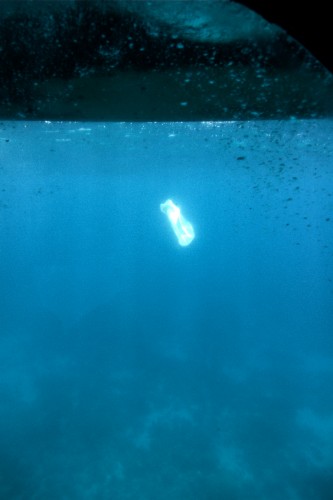
Green Prophet’s Brian travels to Jordan and finds way too much trash out at sea. He asks: What would Iron Eyes Cody do?
It was Saint Ambrose (340 – 397 AD), bishop of Milan Italy who came up with the meme, When in Rome, do as the Romans do. For more than 1600 years this advice has seemed sound. You’ll find variations of it in travel books, tourism websites and travelogues of every sort. But sometimes the advice is wrong.
Sometimes it is impossible or wrong to completely follow local customs. I learned this from a tearful old Native American Indian named Iron Eyes Cody.
The medieval Latin si fueris Rōmae, Rōmānō vīvitō mōre; si fueris alibī, vīvitō sicut ibi translates more correctly as, “If you should be in Rome, live in the Roman manner; if you should be elsewhere, live as they do there.”
Consider this: The Keep America Beautiful public service advertisement made its debut on Earth Day in the spring of 1971. With braided hair and buckskin clothes, a man known as Iron Eyes Cody paddled a birch bark canoe past factory smokestacks onto a filthy shore.
The narrator explains that “Some people have a deep abiding respect for the natural beauty that was once this country. And some people don’t.”
At that, someone throws a handful of rubbish out of their car and it lands on his moccasins. A single teardrop rolls down his cheek and 400 years of guilt over the treatment of Native Americans is dredged up and channeled into the hearts of everyone from aging hippies to members of the Nixon administration. Suddenly it seemed a sensible idea to clean up a once-beautiful country.
[youtube]https://www.youtube.com/watch?v=j7OHG7tHrNM[/youtube]
It didn’t matter that old Iron Eyes Cody was actually an Italian-American actor named Espera Oscar de Corti. And it didn’t matter that early environmental cleanups were mostly cosmetic.
We were inspired when my father drove us out to the local coal power plant to watch the black smoke turn to white steam as scrubbers were installed. The Cuyahoga River stopped catching on fire and even Lake Erie was becoming habitable for species of fish that were incapable of breathing PCBs and mercury.
Signs along long stretches of empty highway in the plains states warned that littering would result in hundreds of thousands of dollars in fines. The threat of that made it impossible for us kids to even consider throwing a candy wrapper out of the car window so we tucked them into ashtrays and sticky seat cushions until we passed the next trash can, possibly a day’s drive away
“Keep America Beautiful” may have been the most effective television advertisement in history and until the shocking success of Ireland’s 15 cent plastic bag tax, was probably the most effective environmental campaign of all time.
So imagine my surprise when I saw someone throw rubbish out of their car onto a Florida road in an action that almost precisely mirrored the litterbugs in the Keep America Beautiful advertisement decades earlier.
I read the words Quebec – je me souviens from their license plate as the car sped off. Wait a minute, Quebec — do you mean Canada?
But everyone knows that all Canadians are nice people. How can this be? It was like finding out that Santa Claus was having a drunken affair with the tooth fairy. It just didn’t make sense. I felt like crying.
Most countries don’t have their own version of the  Keep America Beautiful advertisement. Perhaps they don’t have enough displaced guilt over destroying proud indigenous cultures or maybe they don’t have enough Italian actors with overactive tear glands.
Keep America Beautiful advertisement. Perhaps they don’t have enough displaced guilt over destroying proud indigenous cultures or maybe they don’t have enough Italian actors with overactive tear glands.
So if you were in charge of the Keep the Middle East Beautiful campaign, how would you make people feel guilty about peeing in their own water bowl?
I don’t have the answer. But when my family went swimming at one of the public beaches at Aqaba, Jordan we made an effort to not offend the local sensibilities.
My wife and daughter entered the water fully clothed and I wore a black T-shirt. But there was no mistaking the sun-starved skin of Irish-blooded tourists. We made a spectacle of ourselves just by being there, but we enjoyed seeing the fish and coral reef until a breast stroke caught a discarded plastic bag.
I already had the attention of the local beach crowd so I wondered how I should dispose of this without projecting some kind of ugly foreigner vibe?
What would Iron-Eyes Cody do? He would wear his traditional clothes, paddle his traditional canoe and cry his traditional tears even though that might make him a spectacle on the streets of an industrial neighborhood in Cleveland, Ohio.
I felt many eyes watching me as I walked up to the trash can, deposited the plastic bag and marched back into the water. A few minutes later my snorkel ensnared another plastic bag. Bolder now after those first 15 seconds of fame, I marched up to the trash can and back into the water to find another and another and…
If defiling one of the world’s most beautiful transparent seas was a local custom, I had just broken it.
The same could be said of tourists who go for long walks in car-centric countries where such behavior might considered a cultural faux pas. Muslims and Orthodox Jews visiting Europe should be forgiven for breaking the local custom of leaving a trail of cigarette butts and broken alcohol bottles wherever they go.
Because when in Rome… you can still try to save the earth, even if the Romans don’t care about such things. And if your culture-defying actions happen to teach someone else to not behave like a bad Canadian, more power to you.



